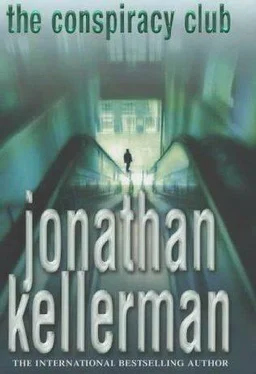“From what?”
“Important issues. Arthur’s a man of substance and experience. One lives a certain amount of time, one experiences .”
“You’re saying there’s something in Arthur’s past that has given him-”
“Don’t worry about Arthur, my dear.” She reached over and rested her fingers atop Jeremy’s sleeve. Stay on target.”
“What’s the target?”
“That’s up to you to find out.”
“Really, Judge-”
She hushed him with a finger on his lip. Angela had done the same thing.
Be quiet, little boy.
A Mercedes pulled up to the gates. Its window rolled down, and a well-fed male face smiled at the judge.
“Hank,” she said. “Are you ready?”
“Ready as ever, Teen. See you on the green.”
The Mercedes rolled to the gates, and the gates swung open automatically. An unseen sentry- up at the guardhouse- knowing who belonged and who didn’t.
Balleron smiled at Jeremy. “Nice to see you again, but I’m afraid I’m going to have to cut our little chat short. Tee time is sacred. Golf’s less a game than a religion. Miss one’s start, and one incurs the wrath of one’s cobelievers.”
Her hand left his wrist and lowered the sun visor. On the inner side was a mirror, and she checked her reflection. Opening the ostrich purse, she pulled out a compact and began dusting her face.
Fixing herself up for golf?
Leaving the ostrich bag wide open and allowing Jeremy to see what lay on top of the usual female stuff.
A shiny little automatic pistol.
Tina Balleron knew he’d seen it. She clicked open the door, and said, “Bye, now.”
“Judge Balleron, something was said that night. ‘Expediency trumps virtue.’ It caused the room to go silent-”
“Silence can be a virtue in and of itself, dear. Till the next time, then.” She smiled and leaned over and kissed his cheek and clicked the door open. Jeremy got out of the Cadillac, and the white car rolled toward the gates of the country club.
She stopped. Down came the window.
“By the way,” she said, “I inquired about those gannet birds- the little monogamous thingies Harrison told us about. You suggested a population issue. I can’t find evidence of such.”
She smiled up at Jeremy.
He said, “Okay.”
“Maybe,” she said, “they just do the right thing.”
She raised the window, resumed driving. Jeremy stood there as the gates rolled open for her. Leaving him outside.
The outsider, always the outsider.
He was back at his desk by four-thirty and collected his messages- consult requests, announcements of meetings, some utter rubbish.
No postcards, no Otolaryngology envelopes.
But there wouldn’t be. Too soon. Everything was paced.
He got back on the computer.
The Clarion was your typical journalistic mediocrity, but it did host an on-line archive that one could access for a fee. Jeremy surrendered a credit card number and logged in.
“Robert Balleron” pulled up five hits, all four to five years old.
Industrialist Found Slain in Office
Some Theorize Balleron Murder Related to Real Estate Success
Balleron Murder Remains a Mystery
Balleron Spouse, a Judge, Questioned
Police Continue to Probe Balleron Murder
Robert A. Balleron, sixty-nine, had been murdered sixty miles away, in Greenwood, an affluent bedroom community. The paper hadn’t covered the crime directly; each piece came over the wire service.
Jeremy pulled them up, one by one. The “developer and real estate magnate” had been found in the home office of his “palatial Tudor mansion,” slumped at an “ornate desk” dead of multiple gunshot wounds. Robert Balleron had been politically active, highly competitive, confrontational when he felt his interests were being threatened. A tough man but beyond reproach ethically- somewhat of a prig, actually, with a history of leveling corruption charges at those he deemed deserving.
The crime scene details were thin: no forced entry, the house’s alarm system had been switched off, and the killer had apparently entered through the office’s French doors, after crossing “the multiacre estate.”
“Unnamed sources” speculated that Balleron’s sharp tongue and aggressive business tactics had alienated the wrong person, and suggestions of murder-for-hire were made. But no follow-up to that theory was offered.
The victim’s wife, Superior Court Judge Tina Balleron, had been out the night of the murder- dining with friends- and had come home to discover the body. She’d been questioned, but a police spokesperson insisted she’d not been considered a suspect.
Jeremy plugged “Balleron Murder” into the archives, got no more hits. Logging out of the newspaper file, he tried several Internet search engines and pulled up a solitary wire-service piece the archive had missed: six months after the murder, the police had come up with no leads, and the case remained open.
He returned to the paper and scanned the next few years for anything on Tina Balleron. Zero.
A prominent woman like that, a notable crime. She’d made a point of keeping out of the public eye.
He searched for homicides of other Greenwood developers and found only an accidental death: Three years ago, a builder of shopping malls named Michael Srivac had perished in a single-car accident. Srivac merited a four-line obituary. In lieu of flowers, contributions should be sent to Planned Parenthood.
Jeremy organized his thoughts. Robert Balleron had been slain five years ago. Tina Balleron’s Cadillac wasn’t much older than that. The developer had gifted his wife with an armored car shortly before his death.
Knowing she was in danger.
She’d survived. And thrived. Stepping down from the bench, moving to the city, joining the Haverford.
One good way to keep a low profile was to leave home.
Pearls and fur and a gun in the purse… the merriest of widows. A strong woman who took care of herself.
Jeremy thought of something the judge had said that afternoon: One lives a certain amount of time, one experiences.
Maybe they’re just doing the right thing.
Was tragic experience what the CCC people had in common? Crime victims, all of them? Did that explain all the interest in the genesis of violence?
That fit with the pall that had followed Maynard’s comment about expedience trumping virtue.
Finally, he sensed he was on to something. Heart pounding, he plugged “Chess homicide” into the archive.
Found nothing.
The same for “Marquis homicide.” “Levy homicide” pulled up the case of a missing Washington intern, but Jeremy could find no connection to Professor Norbert.
Switching back to the general databases proved no more successful.
Wrong Man. Maybe he should just start feeling comfortable with that.
The third postcard arrived three days later. During that period, Jeremy had seen Angela once for coffee, and they’d shared a hurried dinner in the doctors’ dining room before she rushed back to on-call. Both times, she’d looked tired and talked of being worn down.
Yet she’d found time to observe two of Dirgrove’s surgeries.
“You’re okay with that, right?”
“Why shouldn’t I be?”
“He’s all business, Jer… I guess I’m feeling guilty. Overloading my already crazy schedule, not having time for you- I promise to be better when things ease up.”
“You’re fine.”
“That’s nice of you to say- now you see that side of me.”
Читать дальше












